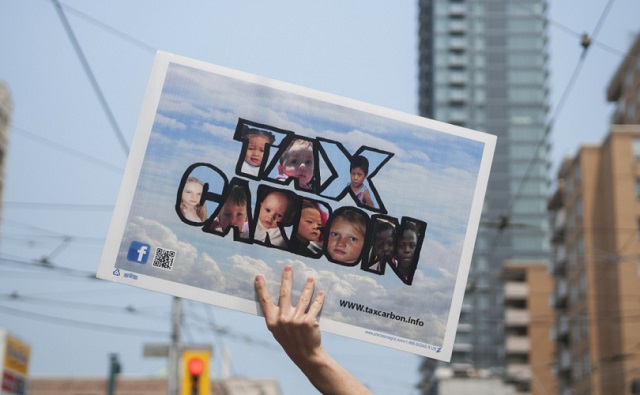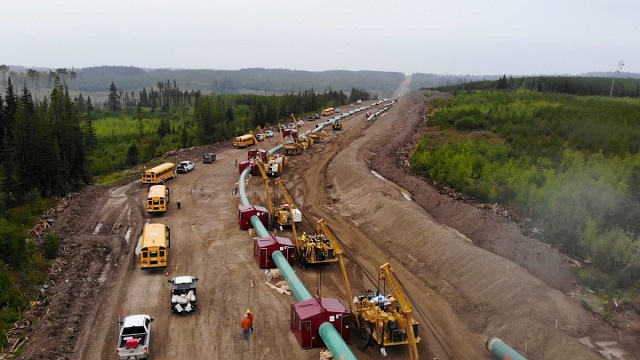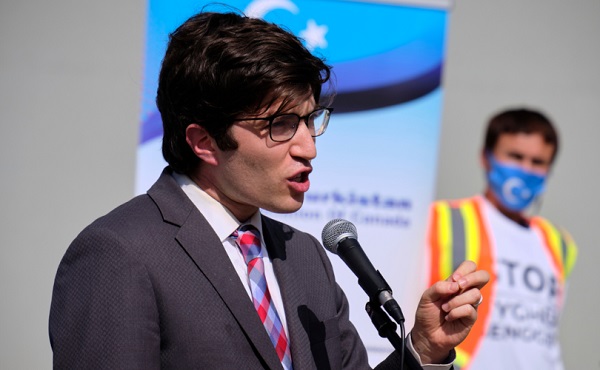Business
Trudeau gov’t has spent nearly $200 million on carbon tax paperwork since 2019: report

From LifeSiteNews
” the Trudeau government was forced to reveal that the tax cost Canadians $82,628,993 last year to collect and then to mail out rebate cheques. The Trudeau government assigned 474 employees to carbon tax paperwork ”
The carbon tax cost Canadians nearly $200 million in paperwork since Parliament introduced the fuel charge in 2019.
According to new records published December 7 by Blacklock’s Reporter, the Liberal government under the leadership of Prime Minister Justin Trudeau spent $199.2 million in taxpayer money on federal administration costs for the carbon tax.
“What were the annual costs to administer collection of the carbon tax and rebate program?” Conservative MP Chris Warkentin questioned in the House of Commons.
In response, the Trudeau government was forced to reveal that the tax cost Canadians $82,628,993 last year to collect and then to mail out rebate cheques. The Trudeau government assigned 474 employees to carbon tax paperwork.
While the Canada Revenue Agency had initially only hired a few employees to manage the carbon tax, the payroll expanded sevenfold after the Trudeau government decided to mail out rebates instead of allowing Canadians to file for the tax credit in their annual returns.
Accordingly, in 2022 there were only 33 employees assigned to the rebate program, but in 2023 the number had risen to 242. Similarly, the total cost of managing the tax rebates increased from $4.3 million in 2022 to $48.6 million in 2023.
Despite the high cost, the Liberal government has maintained that the carbon tax is necessary and the “most efficient” way to cut greenhouse gas emissions.
“Carbon pricing is central to our climate plan because it is the most efficient and lowest cost policy to reduce greenhouse gas pollution,” Canadian Environment Minister Steven Guilbeault claimed last February. “The cost of doing nothing is staggering.”
Similarly, Trudeau defended the cost of collecting the tax last June, saying, “Everyone except apparently the Conservatives understands building in price signals on things we do not want like pollution is one of the most efficient ways of reducing emissions.”
In 2022, Natural Resources Minister Jonathan Wilkinson claimed that 99% of economists agreed on the efficiency of the carbon taxes; however, he failed to cite any paperwork to back up his assertions.
“With respect to the price on pollution, if we asked 100 economists 99 will tell us it is the most efficient way to reduce emissions,” Wilkinson said.
The carbon tax, framed as a way to reduce carbon emissions, has cost Canadians hundreds more annually despite rebates.
The increased costs are only expected to rise, as a recent report revealed that a carbon tax of more than $350 per tonne is needed to reach Trudeau’s net-zero goals by 2050.
Currently, Canadians living in provinces under the federal carbon pricing scheme pay $65 per tonne, but the Trudeau government has a goal of $170 per tonne by 2030.
In October, Trudeau announced that he was pausing the collection of the carbon tax on home heating oil for three years, a provision that primarily benefits the Liberal-held Atlantic provinces. The current cost of the carbon tax on home heating fuel is 17 cents per liter. Most Canadians, however, heat their homes with clean-burning natural gas will not be exempted from the carbon tax.
Despite both Canadians and politicians supporting carbon tax exemptions for all, Trudeau and his government refuse to provide relief.
The government’s current environmental goals – in lockstep with the United Nations’ “2030 Agenda for Sustainable Development” – include phasing out coal-fired power plants, reducing fertilizer usage, and curbing natural gas use over the coming decades.
The reduction and eventual elimination of the use of so-called “fossil fuels” and a transition to unreliable “green” energy has also been pushed by the World Economic Forum (WEF) – the globalist group behind the socialist “Great Reset” agenda – an organization in which Trudeau and some of his cabinet members are involved.
Business
Large-scale energy investments remain a pipe dream

I view the recent announcements by the Government of Canada as window dressing, and not addressing the fundamental issue which is that projects are drowning in bureaucratic red tape and regulatory overburden. We don’t need them picking winners and losers, a fool’s errand in my opinion, but rather make it easier to do business within Canada and stop the hemorrhaging of Foreign Direct Investment from this country.
Thanks for reading William’s Substack!
Subscribe for free to receive new posts and support my work.
Changes are afoot—reportedly, carve-outs and tweaks to federal regulations that would help attract investment in a new oil pipeline from Alberta. But any private proponent to come out of this deal will presumably be handpicked to advance through the narrow Bill C-5 window, aided by one-off fixes and exemptions.
That approach can only move us so far. It doesn’t address the underlying problem.
Anyone in the investment world will tell you a patchwork of adjustments is nowhere near enough to unlock the large-scale energy investment this country needs. And from that investor’s perspective, the horizon stretches far beyond a single political cycle. Even if this government promises clarity today in the much-anticipated memorandum of understanding (MOU), who knows whether it will be around by the time any major proposal actually moves forward.
With all of the talk of “nation-building” projects, I have often been asked what my thoughts are about what we must see from the federal government.
The energy sector is the file the feds have to get right. It is by far the largest component of Canadian exports, with oil accounting for $147 billion in 2024 (20 percent of all exports), and energy as a whole accounting for $227 billion of exports (30 percent of all exports).
Furthermore, we are home to some of the largest resource reserves in the world, including oil (third-largest in proven reserves) and natural gas (ninth-largest). Canada needs to wholeheartedly embrace that. Natural resource exceptionalism is exactly what Canada is, and we should be proud of it.
One of the most important factors that drives investment is commodity prices. But that is set by market forces.
Beyond that, I have always said that the two most important things one considers before looking at a project are the rule of law and regulatory certainty.
The Liberal government has been obtuse when it comes to whether it will continue the West Coast tanker ban (Bill C-48) or lift it to make way for a pipeline. But nobody will propose a pipeline without the regulatory and legal certainty that they will not be seriously hindered should they propose to build one.
Meanwhile, the proposed emissions cap is something that sets an incredibly negative tone, a sentiment that is the most influential factor in ensuring funds flow. Finally, the Impact Assessment Act, often referred to as the “no more pipelines bill” (Bill C-69), has started to blur the lines between provincial and federal authority.
All three are supposedly on the table for tweaks or carve-outs. But that may not be enough.
It is interesting that Norway—a country that built its wealth on oil and natural gas—has adopted the mantra that as long as oil is a part of the global economy, it will be the last producer standing. It does so while marrying conventional energy with lower-carbon standards. We should be more like Norway.
Rather than constantly speaking down to the sector, the Canadian government should embrace the wealth that this represents and adopt a similar narrative.
The sector isn’t looking for handouts. Rather, it is looking for certainty, and a government proud of the work that they do and is willing to say so to Canada and the rest of the world. Foreign direct investment outflows have been a huge issue for Canada, and one of the bigger drags on our economy.
Almost all of the major project announcements Prime Minister Mark Carney has made to date have been about existing projects, often decades in the making, which are not really “additive” to the economy and are reflective of the regulatory overburden that industry faces en masse.
I have always said governments are about setting the rules of the game, while it is up to businesses to decide whether they wish to participate or to pick up the ball and look elsewhere.
Capital is mobile and will pursue the best risk-adjusted returns it can find. But the flow of capital from our country proves that Canada is viewed as just too risky for investors.
The government’s job is not to try to pick winners and losers. History has shown that governments are horrible at that. Rather, it should create a risk-appropriate environment with stable and capital-attractive rules in place, and then get out of the way and see where the chips fall.
Link to The Hub article: Large-scale energy investments remain a pipe dream
Formerly the head of institutional equity research at FirstEnergy Capital Corp and ATB Capital Markets. I have been involved in the energy sector in either the sell side or corporately for over 25 years
Thanks for reading William’s Substack!
Subscribe for free to receive new posts and support my work.
Business
I Was Hired To Root Out Bias At NIH. The Nation’s Health Research Agency Is Still Sick


From the Daily Caller News Foundation
By Joe Duarte
Federal agencies like the National Institutes of Health (NIH) continue to fund invalid, ideologically driven “scientific” research that subsidizes leftist activists and harms conservatives and the American people at large. There’s currently no plan to stop.
Conversely, NIH does not fund obvious research topics that would help the American people, because of institutional leftist bias.
While serving as a senior advisor at NIH, I discovered many active grants like these:
“Examining Anti-Racist Healing in Nature to Protect Telomeres of Transitional Age BIPOC for Health Equity” — Take minority teens to parks in a bid to reduce telomere erosion (the shortening of repetitive DNA sequences as we age). $3.8 million in five years and no results published – not surprising, given their absurd premise.
“Ecological Momentary Assessment of Racial/Ethnic Microaggressions and Cannabis Use among Black Adults” – This rests on an invalid leftist ideological concept – “microaggressions.” An example of a “microaggression” is a white person denying he’s racist. They can’t be validly measured since they’re simply defined into existence by Orwellian leftist ideology, with no attempt to discover the alleged aggressor’s motives.
“Influence of Social Media, Social Networks, and Misinformation on Vaccine Acceptance Among Black and Latinx Individuals” — from an activist who said the phrase “The coronavirus is genetically engineered” was “misinformation” and also conducted a bizarre, partisan study based entirely on a Trump tweet about recovering from COVID.
I will be leaving the great Walter Reed Medical Center today at 6:30 P.M. Feeling really good! Don’t be afraid of Covid. Don’t let it dominate your life. We have developed, under the Trump Administration, some really great drugs & knowledge. I feel better than I did 20 years ago!
— Donald J. Trump (@realDonaldTrump) October 5, 2020
The study claimed that people saw COVID as less “serious” after the tweet. I apologize for the flashback to when Democrats demanded everyone feel the exact level of COVID panic and anti-optimism they felt (and share their false beliefs on the efficacy of school closures, masks, and vaccines ). NIH funded this study and gave him another $651,586 in July for his new “misinformation” study, including $200,000 from the Office of the Director.
I’m a social psychologist who has focused on the harms of ideological bias in academic research. Our sensemaking institutions have been gashed by a cult political ideology that treats its conjectures and abstractions as descriptively true, without argument or even explanation, and enforces conformity with inhumane psychologizing and ostracism. This ideology – which dominates academia and NIH – poses an unprecedented threat to our connection to reality, and thus to science, by vaporizing the distinction between descriptive reality and ideological tenets.
In March, I emailed Jay Bhattacharya, Director of NIH, and pitched him on how I could build an objective framework to eliminate ideological bias in NIH-funded research.
Jay seemed to agree with my analysis. We spoke on the phone, and I started in May as a senior advisor to Jay in the Office of the Director (NIH-OD).
I never heard from Jay again beyond a couple of cursory replies.
For four months, I read tons of grants, passed a lengthy federal background check, started to build the pieces, and contacted Jay about once a week with questions, follow-up, and example grants. Dead air – he was ghosting me.
Jay also bizarrely deleted the last two months’ worth of my messages to him but kept the older ones. I’d sent him a two-page framework summary, asked if I should keep working on it, and also asked if I’d done something wrong, given his persistent lack of response. No response.
In September, the contractors working at NIH-OD, me included, were laid off. No explanation was given.
I have no idea what happened here. It’s been the strangest and most unprofessional experience of my career.
The result is that NIH is still funding ideological, scientifically invalid research and will continue to ignore major topics because of leftist bias. We have a precious opportunity for lasting reform, and that opportunity will be lost without a systematic approach to eliminating ideology in science.
What’s happened so far is that DOGE cut some grants earlier this year, after a search for DEI terms. It was a good first step but caught some false positives and missed most of the ideological research, including many grants premised on “microaggressions,” “systemic racism,” “intersectionality,” and other proprietary, question-begging leftist terms. Leftist academics are already adapting by changing their terminology – this meme is popular on Bluesky:
DOGE didn’t have the right search terms, and a systematic, objective anti-bias framework is necessary to do the job. It’s also more legally resilient and persuasive to reachable insiders — there’s no way to reform a huge bureaucracy without getting buy-in from some insiders (yes, you also have to fire some people). This mission requires empowered people at every funding agency who are thoroughly familiar with leftist ideology, can cleanly define “ideology,” and build robust frameworks to remove it from scientific research.
My framework identifies four areas of bias so far:
- Ideological research
- Rigged research
- Ideological denial of science / suppression of data
- Missing research – research that would happen if not for leftist bias
The missing research at NIH likely hurts the most — e.g. American men commit suicide at unusually high rates, especially white and American Indian men, yet NIH funds no research on this. But they do fund “Hypertension Self-management in Refugees Living in San Diego.”
Similarly, NIH is AWOL on the health benefits of religious observance and prayer, a promising area of research that Muslim countries are taking the lead on. These two gaping holes suggest that NIH is indifferent to the American people and even culturally and ideologically hostile them.
Joe Duarte grew up in small copper-mining towns in Southern Arizona, earned his PhD in social psychology, and focuses on political bias in media and academic research. You can find his work here, find him on X here, and contact him at gravity at protonmail.com.
-

 Business1 day ago
Business1 day agoNew airline compensation rules could threaten regional travel and push up ticket prices
-

 Great Reset2 days ago
Great Reset2 days agoEXCLUSIVE: The Nova Scotia RCMP Veterans’ Association IS TARGETING VETERANS with Euthanasia
-

 Crime1 day ago
Crime1 day agoHow Global Organized Crime Took Root In Canada
-

 Digital ID2 days ago
Digital ID2 days agoLeslyn Lewis urges fellow MPs to oppose Liberal push for mandatory digital IDs
-

 Business1 day ago
Business1 day agoThe numbers Canada uses to set policy don’t add up
-

 Business1 day ago
Business1 day agoWill the Port of Churchill ever cease to be a dream?
-

 Digital ID1 day ago
Digital ID1 day agoRoblox to Mandate Facial and ID Verification
-

 Health2 days ago
Health2 days agoDisabled Canadians petition Parliament to reverse MAiD for non-terminal conditions











